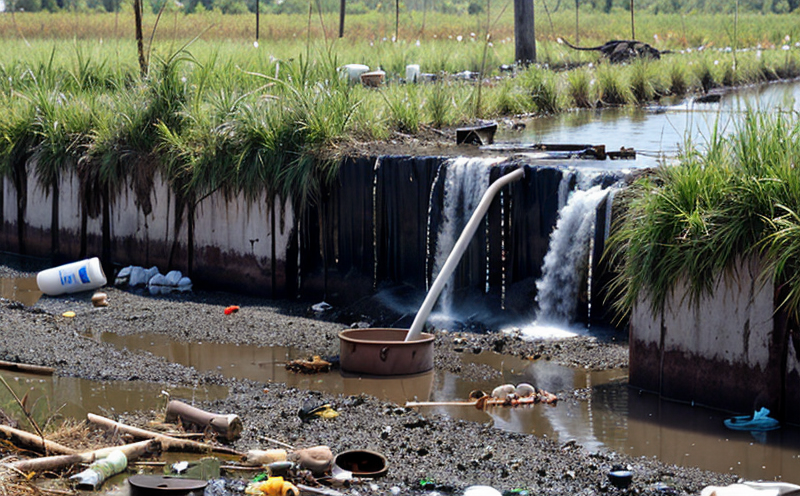Pet Food Pollutant Testing
Pet food safety is a critical concern in today's fast-paced world. Ensuring that pet foods are free from harmful pollutants not only protects the health of our animals but also builds trust with consumers. This service focuses on identifying and quantifying trace levels of pollutants such as heavy metals, pesticides, mycotoxins, dioxins, furans, and other contaminants in pet food products.
The analysis is crucial for compliance with international standards like ISO 17025, which mandates the proficiency and accuracy of testing laboratories. This service caters to quality managers, procurement officers, and R&D engineers who need reliable data to ensure product safety and regulatory compliance. Pollutant testing plays a vital role in safeguarding pets against potential health risks associated with contaminated food.
Our approach combines state-of-the-art analytical techniques with robust laboratory protocols to deliver accurate and actionable results. From sample preparation to final reporting, we adhere strictly to industry best practices outlined by international standards such as ISO 13528 for method validation and ISO/IEC 17025:2017 for quality management.
Our team of experts employs advanced instrumentation including ICP-MS (Inductively Coupled Plasma Mass Spectrometry), HPLC (High Performance Liquid Chromatography), and GC-MS (Gas Chromatography-Mass Spectrometry) to detect even the smallest traces of pollutants. This ensures that every test is conducted with precision and accuracy, providing clients with confidence in their product safety.
The significance of this testing cannot be overstated. Pollutants such as lead (Pb), mercury (Hg), arsenic (As), and cadmium (Cd) can accumulate in pet food over time if not properly managed. These elements, even at trace levels, pose serious health risks to pets, including kidney damage, neurological disorders, and cancer. By identifying these contaminants early on, we help our clients mitigate potential hazards and maintain the integrity of their brand.
Our comprehensive testing services go beyond mere detection; they provide actionable insights that guide corrective actions when necessary. Our reports not only detail the presence or absence of pollutants but also offer recommendations for improvement where required. This proactive approach ensures that our clients are always one step ahead in maintaining high standards of quality and safety.
Scope and Methodology
| Pollutant | Testing Methods | Sensitivity Limits |
|---|---|---|
| Lead (Pb) | ICP-MS, Flame Atomic Absorption Spectroscopy (FAAS) | <0.1 ppm |
| Mercaptans and Mercury (Hg) | Atomic Fluorescence Spectrophotometry (AFS) | <0.01 ppm |
| Arsenic (As) | HPLC with PFPD Detector | <0.5 ppb |
| Cadmium (Cd) | ICP-MS | <0.1 ppm |
| Furans and Dioxins | GC-MS with Supercritical Fluid Extraction | <0.1 pg/g |
The testing process begins with thorough sample preparation, which involves homogenization and digestion to ensure all components are accessible for analysis. Once prepared, samples undergo rigorous quality control measures before being analyzed using the appropriate methods listed in the table above.
Our laboratory adheres strictly to ISO/IEC 17025 standards during testing, ensuring that every step is conducted under controlled conditions. This includes maintaining precise calibration of instruments and adhering to strict sample handling protocols to prevent contamination or degradation.
The results are reported comprehensively, detailing the levels of each pollutant detected along with their confidence intervals. Our team also provides a detailed explanation of any exceedances and recommendations for corrective actions if required. This approach not only meets but exceeds regulatory requirements, providing clients with peace of mind regarding their product safety.
Industry Applications
Pet food pollutant testing is essential for maintaining the highest standards of quality and safety in the pet food industry. This service finds application across various sectors including:
- Manufacturers seeking to ensure compliance with international regulations
- R&D departments exploring new formulations that meet stringent safety criteria
- Procurement teams verifying the quality of raw materials used in production
- Quality assurance divisions monitoring ongoing production processes for consistency and safety
By leveraging our expertise, pet food manufacturers can stay ahead of regulatory changes and market demands. Our testing services are designed to support these efforts by providing reliable data that informs decision-making and ensures compliance.
The insights gained from this testing can also lead to continuous improvement in product formulations. For instance, identifying the sources of contamination allows for targeted interventions in supply chains or production processes. This proactive approach not only enhances product safety but also strengthens brand reputation among consumers.





